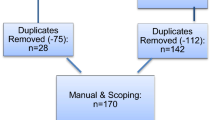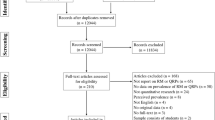Abstract
We conducted a systematic review and meta-analysis of anonymous surveys asking scientists whether they ever committed various forms of plagiarism. From May to December 2011 we searched 35 bibliographic databases, five grey literature databases and hand searched nine journals for potentially relevant studies. We included surveys that asked scientists if, in a given recall period, they had committed or knew of a colleague who committed plagiarism, and from each survey extracted the proportion of those who reported at least one case. Studies that focused on academic (i.e. student) plagiarism were excluded. Literature searches returned 12,460 titles from which 17 relevant survey studies were identified. Meta-analysis of studies reporting committed (N = 7) and witnessed (N = 11) plagiarism yielded a pooled estimate of, respectively, 1.7 % (95 % CI 1.2–2.4) and 30 % (95 % CI 17–46). Basic methodological factors, including sample size, year of survey, delivery method and whether survey questions were explicit rather than indirect made a significant difference on survey results. Even after controlling for these methodological factors, between-study differences in admission rates were significantly above those expected by sampling error alone and remained largely unexplained. Despite several limitations of the data and of this meta-analysis, we draw three robust conclusions: (1) The rate at which scientists report knowing a colleague who committed plagiarism is higher than for data fabrication and falsification; (2) The rate at which scientists report knowing a colleague who committed plagiarism is correlated to that of fabrication and falsification; (3) The rate at which scientists admit having committed either form of misconduct (i.e. fabrication, falsification and plagiarism) in surveys has declined over time.




Similar content being viewed by others
References
Allen, G. N., Ball, N. L., & Smith, H. J. (2011). Information systems research behaviors: What are the normative standards? MIS Quarterly, 35(3), 533–551.
Anderson, M. S., & Steneck, N. H. (2011). The problem of plagiarism. Urologic Oncology, 29(1), 90–94.
Antes, A. L., Murphy, S. T., Waples, E. P., Mumford, M. D., Brown, R. P., Connelly, S., et al. (2009). A meta-analysis of ethics instruction effectiveness in the sciences. Ethics and Behavior, 19(5), 379–402.
Baždarić, K. (2012). Plagiarism detection-quality management tool for all scientific journals. Croatian Medical Journal, 53(1), 1–3.
Baždarić, K., Bilić-Zulle, L., Brumini, G., & Petrovečki, M. (2012). Prevalence of plagiarism in recent submissions to the Croatian medical journal. Science and Engineering Ethics, 18(2), 223–239.
Bebeau, M. J., & Davis, E. L. (1996). Survey of ethical issues in dental research. Journal of Dental Research, 75(2), 845–855.
Bedeian, A., Taylor, S., & Miller, A. (2010). Management science on the credibility bubble: Cardinal sins and various misdemeanors. The Academy of Management Learning and Education, 9, 715–725.
Biagioli, M. (2012). Recycling texts or stealing time? Plagiarism, authorship, and credit in science. International Journal of Cultural Property, 19, 453–476.
Borkowski, S., & Welsh, M. (2000). Ethical practice in the accounting publishing process: Contrasting opinions of authors and editors. Journal of Business Ethics, 25, 15–31.
Bosch, X., Hernandez, C., Pericas, J. M., Doti, P., & Marusic, A. (2012). Misconduct policies in high-impact biomedical journals. PLoS ONE, 7(12), e51928.
Bouville, M. (2008). Plagiarism: Words and ideas. Science and Engineering Ethics, 14(3), 311–322.
Burgess, G. L., & Mullen, D. (2002). Observations of ethical misconduct among industrial hygienists in England. AIHA Journal, 63(2), 151–155.
Butler, D. (2010). Journals step up plagiarism policing. Nature, 466(7303), 167.
Cossette, P. (2004). Research integrity: An exploratory survey of administrative science faculties. Journal of Business Ethics, 49(3), 213–234.
Dhingra, D., & Mishra, D. (2014). Public misconduct among medical professionals in India. Indian Journal of Medical Ethics, 11(2), 104–107.
Dotterweich, D., & Garrison, S. (1998). Research ethics of business academic researchers at AACSB institutions. Teaching Business Ethics, 1(4), 431–447.
Eastwood, S., Derish, P., Leash, E., & Ordway, S. (1996). Ethical issues in biomedical research: Perceptions and practices of postdoctoral research fellows responding to a survey. Science and Engineering Ethics, 2(1), 89–114.
Errami, M., Hicks, J., Fisher, W., Trusty, D., Wren, J., Long, T. C., et al. (2008). Deja vu a study of duplicate citations in medline. Bioinformatics, 24(2), 243–249.
Errami, M., Sun, Z., Long, T. C., George, A. C., and Garner, H. R. (2009). Déjà vu: A database of highly similar citations in the scientific literature. Nucleic Acids Research, 37(Database issue), D921-4.
Fanelli, D. (2009). How many scientists fabricate and falsify research? A systematic review and meta-analysis of survey data. PLoS ONE, 4(5), e5738.
Fanelli, D. (2010). “Positive” results increase down the Hierarchy of the Sciences. PLoS ONE, 5, e10068.
Fanelli, D. (2013). Why growing retractions are (mostly) a good sign. PLoS Medicine, 10(12), e1001563.
Fanelli, D., & Glänzel, W. (2013). Bibliometric evidence for a hierarchy of the sciences. PLoS ONE, 8(6), e66938.
Fanelli, D., & Ioannidis, J. P. A. (2013). US studies may overestimate effect sizes in softer research. Proceedings of the National Academy of Sciences of the United States of America, 110(37), 15031–15036.
Fang, F. C., Steen, R. G., & Casadevall, A. (2012). Misconduct accounts for the majority of retracted scientific publications. PNAS, 109(42), 17028–17033.
Fisher, R. J. (1993). Social desirability bias and the validity of indirect questioning. Journal of Consumer Research, 20(2), 303–315.
Geggie, D. (2001). A survey of newly appointed consultants’ attitudes towards research fraud. Journal of Medical Ethics, 27(5), 344–346.
Giles, J. (2005). Taking on the cheats. Nature, 435, 258–259.
Godecharle, S., Nemery, B., & Dierickx, K. (2013). Guidance on research integrity: No union in Europe. Lancet, 381, 1097–1098.
Greenberg, M., & Goldberg, L. (1994). Ethical challenges to risk scientists: An exploratory analysis of survey data. Science, Technology and Human Values, 19(2), 223–241.
Honig, B., & Bedi, A. (2012). The fox in the hen house: A critical examination of plagiarism among members of the academy of management. Academy of Management Learning & Education, 11(1), 101–123.
Horrom, T. A. (2012). Response to Horrom TA. The perils of copy and paste: Plagiarism in scientific publishing. Journal of Rehabilitation Research & Development, 49(8), vii–xii.
Ioannidis, J. P. (2008). Interpretation of tests of heterogeneity and bias in meta-analysis. Journal of Evaluation in Clinical Practice, 14(5), 951–957.
John, L., Loewenstein, G., & Prelec, D. (2012). Measuring the prevalence of questionable research practices with incentives for truth telling. Psychological Science, 23(5), 524–532.
Kalichman, M. W., & Friedman, P. J. (1992). A pilot-study of biomedical trainees perceptions concerning research ethics. Academic Medicine, 67(11), 769–775.
Kattenbraker, M. S. (2007). Health education research and publication: Ethical considerations and the response of health educators. PhD thesis, Southern Illinois University Carbondale, Carbondale, Illinois, United States.
Kleikamp, E. (2013). CrossCheck-EES integration go-live date announced. http://editorsupdate.elsevier.com/short-communications/crosscheck-ees-integration-go-live-date-announced/. Accessed 9 July 2014.
Koklu, N. (2003). Views of academicians on research ethics. Journal of Educational Sciences & Practices, 2(4), 138–151.
Lipsey, M. W., & Wilson, D. B. (2000). Practical Meta-Analysis. Thousand Oaks, California: SAGE Publications Ltd.
Macaskill, P., Walter, S. D., & Irwig, L. (2001). A comparison of methods to detect publication bias in meta-analysis. Statistics in Medicine, 20(4), 641–654.
Martin, B. R. (2013). Whither research integrity? Plagiarism, self-plagiarism and coercive citation in an age of research assessment. Research Policy, 42(5), 1005–1014.
Martinson, B. C., Anderson, M. S., Crain, A. L., & Vries, R. D. (2006). Scientists’ perceptions of organizational justice and self-reported misbehaviors. Journal of Empirical Research on Human Research Ethics: An International Journal, 1(1), 51–66.
Martinson, B. C., Anderson, M. S., & De Vries, R. (2005). Scientists behaving badly. Nature, 435(7043), 737–738.
Martinson, B. C., Crain, A. L., De Vries, R., & Anderson, M. S. (2010). The importance of organizational justice in ensuring research integrity. Journal of Empirical Research on Human Research Ethics, 5(3), 67–83.
Marušić, A., Bošnjak, L., & Jerončić, A. (2011). A systematic review of research on the meaning, ethics and practices of authorship across scholarly disciplines. PLoS ONE, 6(9), e23477.
May, C., Campbell, S., & Doyle, H. (1998). research misconduct: A pilot study of British addiction researchers. Addiction Research & Theory, 6(4), 371–373.
Nilstun, T., Löfmark, R., & Lundqvist, A. (2010). Scientific dishonesty—questionnaire to doctoral students in Sweden. Journal of Medical Ethics, 36(5), 315–318.
NSF. (2013). Semiannual Report to the Congress. http://www.nsf.gov/pubs/2014/oig14001/oig14001.pdf. Accessed 14 April 2014.
Okonta, P., & Rossouw, T. (2013). Prevalence of scientific misconduct among a group of researchers in nigeria. Developing World Bioethics, 13(3), 149–157.
ORI. (1994). Policy on plagiarism. ORI Newsletter, 3(1).http://ori.hhs.gov/ori-policy-plagiarism. Accessed 8 Augest 2014.
ORI. (2000–2011). The office of research integrity annual report. http://ori.hhs.gov/annual_reports. Accessed 14 March 2014.
Plagiarism pinioned. (2010). Nature, 466(7303): 159–160.
Randall, D., & Fernandes, M. (1991). The social desirability response bias in ethics research. Journal of Business Ethics, 10(11), 805–817.
Reich, E. (2010). Self-plagiarism case prompts calls for agencies to tighten rules. Nature, 468, 745.
Resnik, D. (1998). The ethics of science. New York: Routledge.
Resnik, D., & Master, Z. (2013). Policies and initiatives aimed at addressing research misconduct in high-income countries. PLoS Medicine, 10(3), e1001406.
Resnik, D. B., & Zeng, W. (2010). Research integrity in China: Problems and prospects. Developing World Bioethics, 10(3), 164–171.
Steneck, N. H. (1994). Research universities and scientific misocnduct. Journal of Higher Education, 65(3), 310–330.
Supak-Smolcic, V., & Simundic, A. M. (2013). Biochemia medica has started using the crosscheck plagiarism detection software powered by iThenticate. Biochemia Medica, 23(2), 139–140.
Swazey, J., Anderson, M., & Louis, K. (1993). Ethical problems in academic research. American Scientist, 81, 542–553.
Tangney, J. P. (1987). Fraud will out-or will it? New Scientist, 115(1572), 62–63.
Terrin, N., Schmid, C. H., Lau, J., & Olkin, I. (2003). Adjusting for publication bias in the presence of heterogeneity. Statistics in Medicine, 22, 2113–2126.
Titus, S. L., Wells, J. A., & Rhoades, L. J. (2008). Repairing research integrity. Nature, 453(7198), 980.
U.S. Federal Research Misconduct Policy. (2000) http://www.aps.org/policy/statements/federalpolicy.cfm. Accessed 12 May 2014.
Viechtbauer, W. (2010). Conducting meta-analyses in R with the metafor package. Journal of Statistical Software, 36(3), 1–48.
Wager, E. (2011). How should editors respond to plagiarism? COPE discussion paper. http://publicationethics.org/resources/discussion-documents. Accessed 12 June 2014.
Wager, E., Fiack, S., Graf, C., Robinson, A., & Rowlands, I. (2009). Science journal editors’ views on publication ethics: Results of an international survey. Journal of Medical Ethics, 35, 348–353.
Zhang, Y. H., & Jia, X. (2012). A survey on the use of CrossCheck for detecting plagiarism in journal articles. Journal of Zhejiang University-SCIENCE (A/B/C) PR China, 25(4), 292–307.
Acknowledgments
We thank Mladen Petrovečki for scientific guidance, Lidija Bilić-Zulle, Ksenija Baždarić and Martina Mavrinac for helpful discussions, Fatime Havin Kaya for assistance with the translation from Turkish, and Dora Karmelić for assistance with the collection of data. Author contributions: designed research: DF and VP; collected data: VP; analyzed data: DF; wrote the paper: DF and VP. The study is a part of two scientific projects: “Scientific plagiarism, its prevalence and features” (No. 13.06.1.2.29) and “Knowledge about research integrity at University of Rijeka” (No. 3 %-12-33) both supported by the University of Rijeka.
Author information
Authors and Affiliations
Corresponding author
Electronic supplementary material
Below is the link to the electronic supplementary material.
Rights and permissions
About this article
Cite this article
Pupovac, V., Fanelli, D. Scientists Admitting to Plagiarism: A Meta-analysis of Surveys. Sci Eng Ethics 21, 1331–1352 (2015). https://doi.org/10.1007/s11948-014-9600-6
Received:
Accepted:
Published:
Issue Date:
DOI: https://doi.org/10.1007/s11948-014-9600-6




